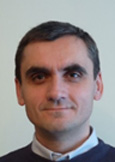
Krzysztof Szymaniec graduated and subsequently received a PhD from the Jagellonian University in Krakˇw, Poland. He was then a research associate at the Time and Frequency lab of the Paris Observatory (now SYRTE), and later at the University of Durham, UK. His work there was devoted to the development of laser cooling techniques with applications to frequency metrology and to experiments on dense samples of cold alkali atoms.
Since 1999, he has been a member of staff at the National Physical Laboratory in Teddington, UK, where he currently holds the position of Principal Research Scientist and leads the caesium fountain primary frequency standards project. His work aims mainly at improvements of the standards' accuracy and operational reliability, as well as integration of the fountains with the local timescale to improve its stability.
Krzysztof is a member of the Working Group on Primary Frequency Standards under the Consultative Committee for Time and Frequency (CCTF); he is a member of the Technical Programme Committee of the European Frequency and Time Forum (he was vice-chair of Group 3 Microwave Frequency Standards in 2013-2015).
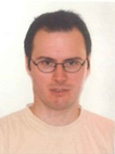
Salvatore Micalizio is a researcher in the Optics Division of INRIM. After receiving the degree in theoretical particle physics from the University of Torino, he joined the Time and Frequency Division of IEN where he was involved in the realization of a Rb maser without inversion of population. In 2001, he received the PhD in Metrology from Politecnico of Torino, and since 2004 he has been on the permanent staff of INRIM. His research activity is mainly devoted to the development of vapour cell frequency standards. He made studies on coherent population trapping, electromagnetically induced transparency, pulsed optical pumping and their possible application to frequency metrology. He was in the key personnel of several research programs funded by ESA. He was responsible for INRIM of a contract funded by the Italian Space Agency devoted to the realization of a POP maser prototype for space applications. He is coordinating the project Mclocks IND 55 funded by the European Metrological Research Program concerning the development of vapour cell clocks for industrial applications. He is also involved in studies on primary atomic frequency standards developed at INRIM.
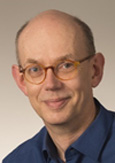
Ekkehard Peik studied physics at the universities of G÷ttingen and Munich, obtaining the diploma (1988) and the PhD degree (1993) from LMU Munich for experimental work with laser-cooled trapped ions and the first experiments on an In+ optical frequency standard. From 1994 to 1996 he was Marie-Curie-Fellow at ENS, Paris, working on laser cooling and quantum effects in atoms. Work in Munich at LMU and MPQ from 1996-2001 included the advancement of the In+ project, the development of novel traps and the first optical frequency measurement of a trapped ion with a fs frequency comb. In 2001 he joined PTB as a staff scientist, became head of the working group 'Optical clocks with trapped ions' in 2003 and of the Time and Frequency Department in 2007. Presently, his main research interests are the Yb+ single-ion optical clock, the promising 229Th nuclear clock, and tests of fundamental physics with clocks.
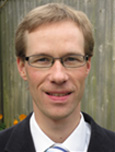
Stephen Webster joined M Squared lasers as their Scientific Products Specialist in September 2012. The company specialises in the research, development and manufacture of solid-state lasers and photonic instruments for a wide range of industrial and scientific applications; his role is to engage with scientific customers and develop new products to meet scientific needs.
Previous to his work at M Squared, Stephen was a senior research scientist at the National Physical Laboratory, UK, for over a decade, where he worked on optical frequency standards, ultra-stable lasers and vibration-insensitive cavities. Highlights of his work there were publications on a force-insensitive optical cavity, the lowest reported acceleration sensitivity for an optical cavity, subhertz laser linewidth, observation of the thermal-noise limit for a cavity and frequency measurements of the electric quadrupole and octupole transitions in 171Yb+ ion. In 2008, he received the Young Scientist of the Year Award at the European Frequency & Time Forum.
Stephen was awarded a DPhil from the University of Oxford in 2000 for work on Bose-Einstein Condensation of atomic gases.
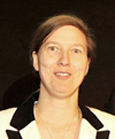
Gesine Grosche is head of the research group for optical frequency dissemination at the German Metrology Institute, PTB, in Braunschweig, Germany. She received her BA degree in Physics from Cambridge University (Trinity College, 1993), UK, and her PhD in Semiconductor Physics from the University of London (Imperial College, 1997). After initially joining PTB to invent optical methods for measuring fluid flow velocities from an airplane, she moved on to coordinate a European project providing reference wavelengths for optical telecommunications, and, from 2003, to establish and develop frequency comb metrology based on mode-locked fiber lasers at PTB. From 2001, she has pursued the vision of ultra-stable frequency dissemination using telecommunication fibre, pioneering and refining techniques for remote metrology, which includes remote frequency measurements and frequency synthesis. Her group currently concentrates on long-distance phase-stable fibre links, and in 2015, jointly with the French group, established the first international optical carrier link between Paris and Braunschweig via Strasbourg. Work continues to compare the best clocks in metrology institutes across Europe.
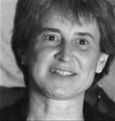
Patrizia Tavella has a degree in Physics and a PhD in Metrology. She is now senior scientist with the Italian Metrology Institute, INRIM, Torino, Italy. Her main interests are mathematical and statistical models, mostly applied to atomic time scale algorithms. Patrizia chaired the working groups on 'International Atomic Time' and 'Algorithms' of the Consultative Committee of Time and Frequency. She is deeply involved in the development of the European Navigation System Galileo, and is currently IEEE UFFC Distinguished Lecturer.
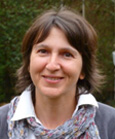
Pascale Defraigne obtained her PhD in Geophysics in 1995 at the UniversitÚ Catholique de Louvain. Since 1997, she has managed the time and frequency activities at the Royal Observatory of Belgium, where the Belgian reference UTC (ORB) is maintained. Her research activities mainly concern the use of satellite navigation systems for time and frequency transfer. Pascale presently chairs the CCTF working group on GNSS time transfer, and contributes to the validation of Galileo timing signals.
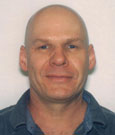
Craig Nelson is an electrical engineer at the Time and Frequency Division of the National Institute of Standards and Technology (NIST). He received his BSEE from the University of Colorado in Boulder in 1990. After co-founding SpectraDynamics, a supplier of low phase noise components, he joined the staff at NIST. He has worked on the synthesis and control electronics, as well as software, for both the NIST-7 and F1 primary frequency standards. He is presently involved in research and development of ultra-stable synthesizers, low phase noise electronics, and phase noise metrology. Current areas of research include optical oscillators, pulsed phase noise measurements and phase noise metrology in the MHz to THz range. He has published over 70 papers and teaches classes, tutorials, and workshops at NIST, the IEEE Frequency Control Symposium, and several sponsoring agencies on the practical aspects of high-resolution phase noise metrology. He was awarded the NIST Bronze Medal in 2012 and the Allen V. Astin Measurement Science Award in 2015 for developing a world-leading program of research and measurement services in phase noise.
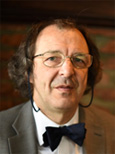
Enrico Rubiola is full professor at the UniversitÚ de Franche ComtÚ and deputy director of the Department of Time and Frequency of the CNRS FEMTO-ST Institute, Besanšon, France. Formerly, he was a full professor at the UniversitÚ Henri PoincarÚ, Nancy, France, a guest scientist at the NASA JPL, a professor at the UniversitÓ di Parma, Italy, and an assistant professor at the Politecnico di Torino, Italy.
He graduated in electronic engineering at the Politecnico di Torino in 1983, received a PhD in Metrology from the Italian Minister of University and Research, Roma (1989), and a ScD degree from the UniversitÚ de Franche ComtÚ in 1999.
Prof Rubiola has worked on various topics of electronics and metrology, navigation systems, time/frequency comparisons, and frequency standards. His main fields of interest are precision electronics form dc to microwaves, and time and frequency metrology. This includes phase and amplitude noise, analog and digital frequency synthesis, high spectral purity oscillators, photonic systems, sophisticated instrumentation, spectral analysis, and noise. He has developed innovative instruments for AM/PM noise measurement with ultimate sensitivity, and a variety of dedicated signal-processing methods. Since 2012, Enrico is the PI of Oscillator IMP, a platform dedicated to the measurement of AM/PM noise and short-term frequency stability.
A wealth of articles, reports and conference presentations are available on Enrico's homepage: http://rubiola.org
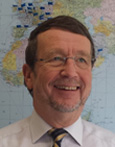
Bernd Neubig established AXTAL GmbH & Co KG in 2003 as a company for design, prototyping and manufacturing of specialised frequency control products, mainly for aerospace, space and niche applications. Prior to that, he worked in a variety of research and development roles in crystal design, filters and oscillators, progressing to vice president of TELE QUARZ GmbH.
Bernd graduated as an engineer in telecommunications from the University of Applied Sciences, Berlin, in 1969 and as a physicist from the Technical University, Berlin in 1975.
Bernd has been a long-standing member on many committees, including the Technical Program Committee of the IEEE Frequency Control Symposium and the Scientific Committee of EFTF. His work has attracted numerous awards and last year he received the Marcel?Ecabert award from the European Frequency and Time Forum.